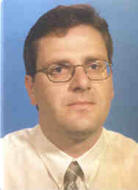Affiliated Academic Partners
Ass. Professor Dimitrios Soudris
Role within the ArtistDesign European Network of Excellence
 Collaboration with IMEC vzw.and contribution to the Hardware Platforms and MPSoC cluster and the Software Synthesis, Code Generation and Timing Analysis cluster.
Collaboration with IMEC vzw.and contribution to the Hardware Platforms and MPSoC cluster and the Software Synthesis, Code Generation and Timing Analysis cluster.
 Collaboration with IMEC vzw.and contribution to the Hardware Platforms and MPSoC cluster and the Software Synthesis, Code Generation and Timing Analysis cluster.
Collaboration with IMEC vzw.and contribution to the Hardware Platforms and MPSoC cluster and the Software Synthesis, Code Generation and Timing Analysis cluster. Company or Institution
 Greek National Technical University (NTUA)
Greek National Technical University (NTUA)Contact
 Home page: http://www.microlab.ntua.gr/~dsoudris/
Home page: http://www.microlab.ntua.gr/~dsoudris/
Research interests
Dimitrios Soudris received his Diploma in Electrical Engineering from the University of Patras, Greece, in 1987. He received the Ph.D. Degree in Electrical Engineering, from the University of Patras in 1992. He is currently working as Assistant Professor in Electrical and Computer Engineering, National Technical University of Athens (NTUA), Greece. His research interests include low power design, parallel architectures, embedded systems design, and VLSI signal processing. He was leader and principal investigator in numerous research projects funded from the Greek Government and Industry as well as the European Commission (ESPRIT II-III-IV and 5th, 6th and 7th IST). He is a member of the IEEE, the VLSI Systems and Applications Technical Committee of IEEE CAS and the ACM.Role in leading conferences/journals/etc in the area
Dimitrios Soudris has (co-)authored over 180 papers in international journals and conferences, and has coauthored and edited 4 text books. He has served as General Chair and Program Chair for PATMOS’ 99 and 2000 and General Chair IEEE/CEDA VLSI-SOC 2008. He received an award from INTEL and IBM for the project results of LPGD #25256 (ESPRIT IV) and 4th position in ASP-DAC 2005 Design Contest for AMDREL IST-34793.Notable past projects
LPGD projectDesign of a low power GFSK/GMSK modulator/demodulator for DECT receivers.
AMDREL project
Development of dynamic memory management design methodologies for emebedded syetems. Design of a low energy FPGA and a software supported design flow.
Awards / Decorations
Dimitrios Soudris received an award from INTEL and IBM for the project results of LPGD #25256 (ESPRIT IV) and 4th position in ASP-DAC 2005 for AMDREL IST-34793.Further Information
Dimitrios Soudris is also member at the Institute of Communications and Computer Systems(c) Artist Consortium, All Rights Reserved - 2006, 2007, 2008, 2009

